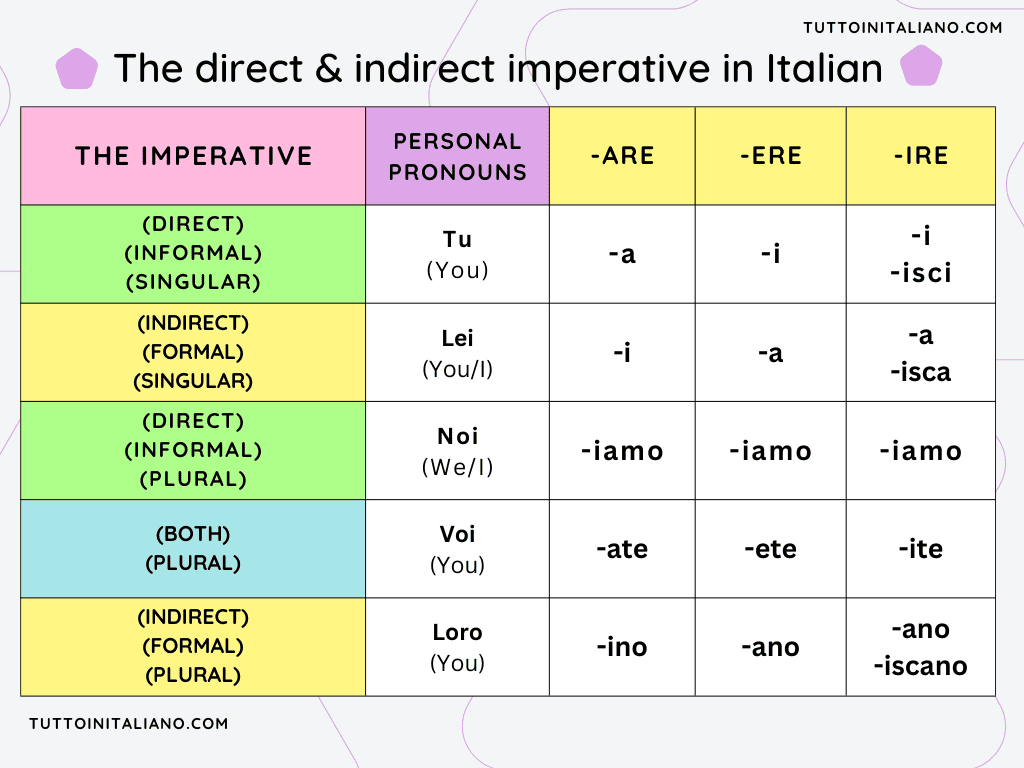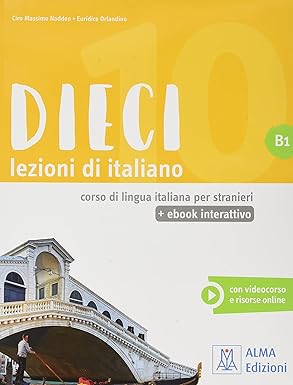
The imperative in Italian is used to express orders or requests in a “strong” form, but also to send greetings, invitations, and recommendations.
- Chiudete la porta!
- (Close the door!)
- Rispondi al telefono!
- (Answer the phone!)
- Si accomodi, professore!
- (Sit down, professor!)
- Facciamo presto!
- (Let’s do it quickly!)
- Mi raccomando: Scrivi!
- (I recommend: Write!)
- Guida con prudenza!
- (Drive with caution!)
- Mangiamo!
- (Let’s eat!)
- Sbrigatevi!
- (Hurry up!)
- Stammi bene!
- (Take care!)
- Non Correre!
- (Do not rush!)
- Aspetta!
- (Wait up!)
How to form the imperative in Italian? Formal and Informal
The imperative in Italian has two forms: direct and indirect or formal and informal.
- The direct, and informal imperative are the same thing.
- The indirect, and formal imperative are the same thing.
The imperative in Italian is formed by changing the ending of the verb in the infinitive like this.
| The imperative | Personal pronouns | -are | -ere | -ire |
| (Direct) (Informal) (Singular) | Tu (You) | -a | -i | -i -isci |
| (Indirect) (Formal) (Singular) | Lei (You/I) | -i | -a | -a -isca |
| (Direct) (Informal) (Plural) | Noi (We/I) | -iamo | -iamo | -iamo |
| (Both) (Plural) | Voi (You) | -ate | -ete | -ite |
| (Indirect) (Formal) (Plural) | Loro (You) | -ino | -ano | -ano -iscano |
The conjugation of the imperative in Italian
Here is the conjugation of the imperative in Italian for regular verbs:
| Personal pronouns | Lavorare (to work) | Mettere (to put) | Partire (to leave) | Finire (to finish) |
| Tu | Lavora | Metti | Parti | Finisci |
| Lei | Lavori | Metta | Parta | Finisca |
| Noi | Lavoriamo | Mettiamo | Partiamo | Finiamo |
| Voi | Lavorate | Mettete | Partite | Finite |
| Loro | Lavorino | Mettano | Partano | Finiscano |
Of course, since you don’t give orders to yourself, the imperative doesn’t have the first-person singular (io).
The third person singular (Lei) and the third person plural (Loro) are used only for the formal/ direct form.
The first person plural (noi) is used to invite or encourage a group of people you belong to.
- Parti immediatamente!
- (Leave immediately!)
- Entri, Signora!
- (Come in, Lady!)
- Lavoriamo ancora per una mezz’ora!
- (We still work for half an hour!)
- Mettete in ordine la vostra stanza!
- (Tidy up your room!)
- Signori, finiscano pure con calma!
- (Gentlemen, please end it calmly!)
When to use the formal imperative in Italian?
The (direct) formal imperative in Italian is used in the form of courtesy.
| Singular (Lei) | Plural (Voi/Loro) |
| Guardi quella luce, dottore! (Look at that light, doctor!) Metta i libri sul tavolo, signorina! (Put the books on the table, miss!) Finisca pure il caffè, professore! (Finish the coffee, professor!) | State attenti, signori! (Be careful, gentlemen!) Stiano attenti, signori! (Beware, gentlemen!) |
Verbs ending in (-care) and (-gare) keep the “hard” sound of C and G and add H in front of the third person singular and the first and third person plural.
| Personal pronouns. | Cercare (to search) | Pagare (to pay) |
| Tu | Cerca | Paga |
| Lei | Cerchi | Paghi |
| Noi | Cerchiamo | Paghiamo |
| Voi | Cercate | Pagate |
| Loro | Cerchino | Paghino |
- Cerchi bene, signora: vedrà che troverà I documenti.
- (Search well, lady: you will see that you will find the documents.)
- Cerchiamo ancora!
- (Let’s try again!)
- Parghino alla cassa, Signori.
- (Talk to the cashier, gentlemen)
Verbs ending in (-iare) have only one (i) in the third-person singular and the first and third-person plural.
| Cominciare (to start) | Mangiare (to eat) | Lasciare (to let) | Studiare (to study) |
| Comincia | Mangia | Lascia | Studia |
| Cominci | Mangi | Lasci | Studi |
| Coninciamo | Mangiamo | Lasciamo | Studiamo |
| Cominciate | Mangiate | Lasciate | Studiate |
| Comincino | Mangino | Lascino | Studino |
- Lasci la valigia, Signora: la porto io.
- (Leave your suitcase, Madam: I’ll take it.)
- Mangiamo qualcosa: sto morendo di fame.
- (Let’s eat something: I’m starving)
The verb (Sciare) keeps the (i) in the third person singular and third person plural: Scii, Sciino
Italian imperative irregular verbs
These are the forms of the most used irregular verbs in the imperative mood.
| Essere (to be) | Avere (to have) | Sapere (to know) |
| Sii Sia Siamo Siate Siano | Abbi Abbia Abbiamo Abbiate Abbiano | Sappi Sappia Sappiamo Sappiate Sappiano |
| Uscire (to go out) | Andare (to go) | Dare (to give) |
| Esci Esca Usciamo Uscite Escano | Va’ Vada Andiamo Andate Vadano | Da’ Dia Diamo Date Diano |
| Fare (to do) | Stare (to stay) | Dire (to say) |
| Fa’ Faccia Facciamo Fate Facciano | Sta’ Stia Stiamo State Stiano | Di’ Dica Diciamo Dite Dicano |
| Bere (to drink) | Scegliere (to choose) | Salire (to go up) |
| Bevi Beva Beviamo Bevete Bevano | Scegli Scelga Scegliamo Scegliete Scelgano | Sali Salga Saliamo Salite Salgano |
| Tenere (to keep) | Venire (to come) | |
| Tieni Tenga Teniamo Tenete Tengano | Vieni Venga Veniamo Venite Vengano |
- Dai/ da’ la mano alla signora!
- (Give the lady hand!)
- Uscite di qui!
- (Get out of here!)
- Stia tranquillo!.
- (Don’t worry!)
- Sappiate che io non sono d’accordo!.
- (Know that I disagree!)
- Di’ quello che pensi!.
- (Say what you think!)
- Fai / Fa’ attenzione!
- (Pay / Pay attention!)
- Vieni con me!
- (Come with me!)
- Scegli quale vuoi!.
- (Choose which one you want!)
Verbs ending in -urre /-orre follow this model.
| Tradurre (to translate) | Porre (to put) |
| Traduci | Poni |
| Traduca | Ponga |
| Traduciamo | Poniamo |
| Traducete | Ponete |
| Traducano | Pongano |
- Traduci la lettera in tedesco!
- (Translate the letter into German!)
- Producete di più!
- (Produce more!)
Amazon ad:
The negative form of the imperative in Italian
The negative form is done by putting (Non) in front of the imperative, except for the second person singular (tu) the verb must be in the infinitive
| Personal pronoun | Mettere |
| tu | Non mettere |
| lei/lui | Non metta |
| noi | Non mettiamo |
| voi | Non mettete |
| loro | Non mettano |
- Non Mettere lo zucchero nel mio caffè.
- (Don’t put sugar in my coffee)
- Non siate scortesi.
- (Don’t be rude)
- Non aprite le finestre!
- (Don’t open the windows!)
- Non perda tempo se vuole prendere il treno.
- (Don’t waste time if you want to take the train)
- Non fate rumore: Lorenzo dorme.
- (Make no noise: Lorenzo is asleep)
- Mi raccomando, Luca: non tornare tardi.
- Please, Luca: Don’t come back late)
The imperative in Italian with pronouns
In affirmative sentences, the atonic form of pronouns (direct, indirect, reflexive, ne and ci) are always combined with the second person singular (Tu) or plural (Voi) and first person plural (Noi) of the imperative.
Here, for example, the conjugation of verb mettersi
| Personal pronoun | Mettersi |
| tu | Mettiti |
| lei/lui | Si Metta |
| noi | Mettiamoci |
| voi | Mettetevi |
| loro | Si mettano |
- Sono stati molto gentili: ringraziali.
- (They were very kind: thank them.)
- Salutami tua sorella.
- (Say hello to your sister)
- Se ci sono dei problemi, discutiamone.
- (If there are any problems, Let’s discuss them)
- C’è uno spettacolo interessante: andiamoci.
- (There is an interesting show: let’s go there)
- Vestitevi: fra poco usciamo.
- (Get dressed: we’ll be out soon)
- Gino ha troppo lavoro: dagli* una mano!
- (Gino has too much work: Give him a hand)
*When the verb has two forms, the shorter form must be used together with pronouns (the one with the apostrophe)
In the negative sentences, on the other hand, you can choose whether to combine the pronoun with the imperative or put it before the verb.
- Non invitarli! = Non li invitare!
- (Don’t invite them!)
- Non ditegli nulla. = Non gli dite nulla.
- (Don’t tell him anything)
- Non guardarti allo specchio. = Non ti guardare allo spicchio.
- (Don’t look in the mirror)
- Non parlarne. = Non ne parlare.
- (Don’t talk about it)
- Non metterci il sale. = Non ci mettere il sale.
- (Don’t put salt in it)
When the atonic form of pronouns are joined to the forms (di’, fa’, sta’, and va’) The first consonant of the pronouns doubles (except for the indirect pronoun gli):
- Dammi la mano.
- Give me a hand
- Dille tutto quello che pensi.
- Tell her everything you think)
- Fatti tagliare i capelli.
- Get your hair cut)
- Stammi bene.
- (Take care)
- Il negozio sta per chiudere: vacci subito.
- (The shop is about to close: Go there now)
- Fai i biscotti? fanne un po’ anche per me.
- (Do you make cookies? do some for me too.)
- Dagli quello che chiede.
- Give him what he asks for)
Uses of the imperative in Italain
As we have seen, the imperative is used for orders, commands, requests, invitations, recommendations, and advice.
- Metti l’acqua in tavola.
- Put the water on the table
- Siediti!
- Sit down
- Rendimi subito i soldi: mi servono.
- give me the money back now: I need it!
- Entra, accomodati!
- Come in, take a seat!
- Stai attento quando attraversi la strada.
- (Be careful when crossing the street)
- Non bere se devi guidare.
- (Don’t drink if you have to drive)
Orders, commands, and instructions can also be expressed impersonally with the present infinitive.
- Leggere attentamente le istruzioni.
- (Read the instructions carefully)
- Chiudere la porta.
- (Close the door)
- Non usare l’ascensore in caso di incendio.
- (Do not use the elevator in case of fire)
- Spingere. / Tirare.
- (Puch / Pull)
To express orders or requests in a less forceful way, instead of the imperative, you can use the verbs Dovere, Potere, and Volere , often in the interrogative form, in the indicative, or in the present conditional.
- Puoi venire qui un moment?
- (Can you come here for a moment?)
- Potresti venire qui un moment?
- (could you come here for a moment?)
- Dovresti aiutare Alma.
- (You should help Alma)
- Vuoi mettere in ordine la tua stanza?!
- (Do you want to tidy up your room?!)


